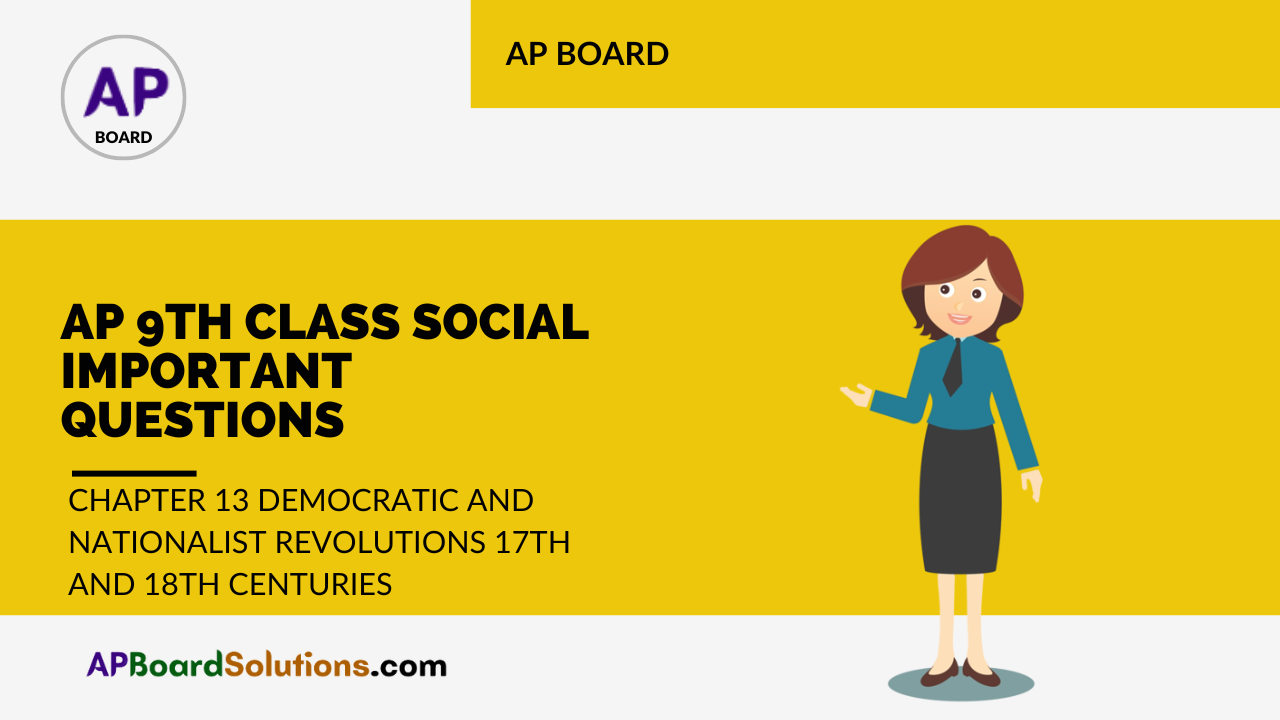These AP 9th Class Social Studies Important Questions 13th Lesson Democratic and Nationalist Revolutions 17th and 18th Centuries will help students prepare well for the exams.
AP State Syllabus 9th Class Social 13th Lesson Important Questions and Answers Democratic and Nationalist Revolutions 17th and 18th Centuries
9th Class Social 13th Lesson Democratic and Nationalist Revolutions 17th and 18th Centuries 1 Mark Important Questions and Answers
Question 1.
What was Slogan raised in American Independence? (SA-II : 2016-17)
Answer:
“No taxation without representation.”
Question 2.
What was the uniqueness of ‘Bloodless Revolution’? (SA-III : 2016-17)
(OR)
Why was the England revolution called as a bloodless revolution? (SA-I : 2018-19)
Answer:
The supreme power was transferred from king to parliament without shedding a drop of blood or firing a single shot.
![]()
Question 3.
What is the Jacobin Clubs? (SA-II : 2017-18)
Answer:
People who wish to discuss policies and plan their own form of action. These are called Political Clubs. One of such is Jacobin Club.
Question 4.
What was the effect of Glorious revolution? (SA-II : 2018-19)
Answer:
Not only was an absolutist catholic monarch removed, but the declaration of rights ensured the sovereignty of parliament and imposed significant limitations on the prerogatives of the crown.
Question 5.
Answer questions (a) and (b) based on the table given below. (SA-I : 2018-19)
| Livres – | Unit of currency in France, discontinued in 1974. |
| Clergy – | Group of persons invested with special functions in the church. |
| Tithes – | A tax levied by the church, comprising one-tenth of the agricultural produce. |
| Taille – | Tax to be paid directly to the state. |
| Nobles – | Rich landlords, king’s family members. |
a) What percentage of tax was levied by the church?
b) Find the terms related to tax from the above table.
Answer:
a) A tax leived by the church, comprising 1/10th of agricultural produce.
b) Terms related to tax are
1) Tithes
2) Taille
![]()
Question 6.
State the importance of Declaration of the ‘Rights of Man1 in France. (SA-I : 2019-20)
Answer:
The importance of Declaration of the Rights of Man is to provide,
Rights to the people; such as freedom of religion, freedom of speech, freedom of assembly and separation of powers. Women were denied from these rights.
9th Class Social 13th Lesson Democratic and Nationalist Revolutions 17th and 18th Centuries 2 Marks Important Questions and Answers
Question 1.
What do you know about ‘bloodless revolution (or) glorious revolution? (SA-II : 2017-18)
Answer:
In 1688, William of Orange and his wife Mary were invited by the Parliament to occupy the throne of England. A new arrangement was worked out by which ministers were responsible to the Parliament and the powers of the king were restricted. The supreme power was transferred to Parliament, without shedding a drop of blood of firing a single shot.
Question 2.
Look the timeline given below. (SA-I : 2019-20)

i) Which revolution does the timeline indicate?
Answer:
American Revolution indicates in the above time line.
ii) In this revolution, against which country the people fought for their independence?
Answer:
England.
9th Class Social 13th Lesson Democratic and Nationalist Revolutions 17th and 18th Centuries 4 Marks Important Questions and Answers
Question 1.
When the French Revolutionaries were preparing the declaration of Rights of Men in 1791, many French women protested against this and drafted a separate declaration of the Rights of Women. It declared – “Women are born free and remain equal to men in rights.
Read the above paragraph and explain your opinion on “Women – Right to Vote”. (SA-II : 2016-17)
Answer:
If the women has Right to vote the following benefits are there :
- The moral, educational and humane legislation desired by women would be got more easily if women had votes.
- The laws unjust to women would be amended more quickly.
- Equal suffrage would increase the proportion of educated voters.
- It leads to fair treatment of women in the public service.
- It would help those women who need help the most.
![]()
Question 2.
Examine the table and answer the following questions. (SA-II : 2016-17)
| A Jacobin Constitution | Club for radical democracy thinkers all people were given the right to vote and the right of insurection. The constitution stated that the government must pronde the people with work (or) livelihood. |
| B Aristocracy | Socially and Politically, a landed Aristocracy was the dominant class on the continent. The members of this class were united by a common way of life that across regional divisions. |
| C Liberal Nationalism | Ideas of National unity in early Nineteenth century Europe were closely allied to the ideology of liberalism. Liberalism stood for freedom for the individual and equality of all before the law. |
Answer the following Questions.
1. Jocabin constitution belongs to which country?
2. Which ideology was closely allied to the idea of National Unit?
3. Which stood for freedom for the individual and equality to all before the law?
4. Members of which class wee united by a common way of life?
Answer:
- Jacobin constitution belongs to the country of France.
- Ideas of national unity in early 19th century Europe were closely allied to the ideology of liberalism.
- Liberalism stoods for freedom for the individual and equality of all before the law.
- The members of Aristocracy class were united by a common way of life that across regional divisions.
Question 3.
Observe the given table and answer the following questions.
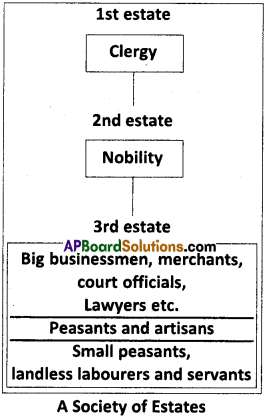
a) How many estates were there? What were their names?
(OR)
How many estates were there in French Society? (SA-II : 2016-17) (SA-II : 2017-18)
Answer:
There were three estates. First estate, second estate, and the third estate.
b) Who belonged to 3rd estate? (SA-II : 2016-17)
Answer:
Business men, merchants, officials, artists, peasants and artisans, small peasants, landless labour, servants, etc. constitute the third estate.
c) What were the problems faced by third estate? (SA-II : 2016-17)
Problems of third estate.
1) There is no equality.
2) Scarcity of food.
3) More taxes were imposed by church and govt.
4) 90% of people are landless people.
d) Which were privileged group? (SA-II : 2016-17)
Answer:
The Clergy and the Nobility were privileged group in the French society.
e) Which is the Superior group in French Society? (SA-II : 2017-18)
Answer:
Clergy is the superior group in the French society.
f) Who were the richest group in third Estate? (SA-II : 2017-18)
(OR)
Name the richer groups in third estate. (SA-II : 2018-19)
Answer:
Big business men, merchants, court officials, Lawyers, etc. were the richest groups in third estate.
g) Which Estate people did only pay the taxes in French Society? (SA-II : 2017-18)
(OR)
Which group paid taxes to the church? (SA-I : 2018-19)
Answer:
Third estate people only pay the taxes to the government.
h) Who were in first estate? (SA-I : 2018-19)
In first estate clergy are there.
i) Which country’s information is shown in the above chart? (SA-I : 2018-19)
Given information is related to France.
j) What does the above picture represent?
Answer:
The above picture represents the division of the society in France.
k) Who were the majority people?
Answer:
The third estate were the majority people.
Question 4.
The picture below shows the political system under the constitution of 1791 in France. Observe it carefully and answer the questions given.
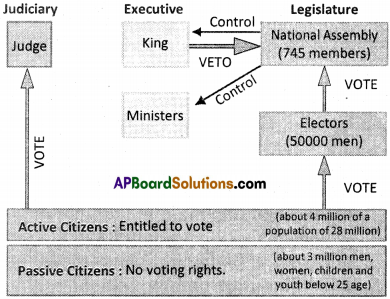
a) Who had the power to elect the judiciary in the above system? (SA-II : 2018-19)
Answer:
Active citizens, who have the vote.
b) Who had the power over the King and the Ministers in the above system? (SA-II : 2018-19)
Answer:
National Assembly has more powers on king and ministers.
c) Who had the power to veto the laws made by the National Assembly? (SA-II : 2018-19)
Answer:
King has the power to veto the laws made by the National Assembly.
d) Which branch of government was responsible for the implementation of laws? (SA-II : 2018-19)
Answer:
Executive was responsible to the implementation of laws.
e) Who has veto power? (SA-II : 2016-17)
Answer:
King has veto power.
f) Who is having vote to elect the judge? (SA-II : 2016-17)
Answer:
Active citizens who have the Right to vote.
Question 5.
French revolution is regarded as one of the most important events in history not just in France but also across Europe and the world. Explain with reference to the ideas propagated by the French Revolution. (SA-I : 2019-20)
Answer:
Ideas of French Revolution :
Liberty, Equality and Fraternity are the ideas of French Revolution.
1. The ideas of the French Revolution were drawn from the Enlightenment, influenced by the British political system, inspired by the American Revolution and shapped by local grievances.
2. The French Revolution supported the motto of Liberty, Equality, Fraternity because it eliminated the old social classes, overthrew the monarchy and brought the church under state control. People of all social classes were citizens and they all had equal rights.
Liberty :
Liberty meant freedom from all soils of torture and abuse.
Equality :
Provide Equality to the people in all spheres without discrimination.
Fraternity :
It creates brotherhood nature among the people.
![]()
Question 6.
“With the emergence of nation states in Europe, the dominance of aristocracy declined and that of the middle class increased.” Do you agree with the statement? Give reasons. (SA-I : 2019-20)
Answer:
Yes, I agree with the statement that the emergence of nation – states in Europe the dominance of Aristocracy declined, and middle class increased.
Reasons:
- The middle class people were educated, so they became lawyers, other administrative officials.
- The read the books which are written by John Lock, Rousseau and believed that no group in society should be privileged by birth.
- They understood a person’s social position must depend on his merit.
- Rousseau carried the idea forward, proposing a form of government based on a social contract between people and their representatives.
The above ideas provoke the middle class fight for equality and end of special privileges.
9th Class Social 13th Lesson Democratic and Nationalist Revolutions 17th and 18th Centuries Important Questions and Answers
Question 1.
Compare the results of the English and American Revolutions. Which one managed to build entirely new principles of government?
Answer:
- Glorious revolution of England made an agreement of powersharing with the king.
- American revolution set up democratic government.
- The British people sought more rights from king.
- Americans prepared own constitution and established democracy by abolishing the English supremacy.
- American revolution managed to build entirely new principles of government.
![]()
Question 2.
Can you think of why America was able to establish a democratic republic while England could not?
Answer:
- American people were against the taxation without representation.
- They do not want to be ruled by the British as colonies.
- They wanted to assert their independence and to be a democratic republic.
- Whereas the English, especially the influential middle class did not long for a demo-cratic republic.
- They were readily accepted a powersharing agreement between them and the king.
- Thus they could not set up a republic then.
Question 3.
In what ways did the American Constitution ensure maximum freedom for its people?
Answer:
- The Constitution of America guarantees maximum freedom to its people.
- It divided political power between centre and states such that it gave maximum autonomy for the states.
- A bill of rights was passed which guaranteed freedom of speech and religion.
- It guaranteed fundamental rights to all citizens.
- Thus we can say American Constitution ensures maximum freedom for its people.
Question 4.
Write about the Declaration of Independence in the American war of Independence.
Answer:
- The Declaration of Independence was adopted on 4th July 1776, during the Third Congress at Philadelphia.
- Thomas Jefferson was the author of the Declaration.
- It declared that all men are created equal and are endowed with certain rights like liberty, equality and pursuit of happiness.
Question 5.
Write about Bill of Rights of the American war of Independence.
Answer:
- A Bill of Rights was adopted guaranteeing the freedom of speech, religion and rule of law were enacted.
- This paved way for the establishment of the United States of America.
![]()
Question 6.
What do you know about the Reign of Terror?
(OR)
“The period from 1973 to 1974 in France is referred as the region of terror”. Give reason. (SA-I : 2018-19)
Answer:
- The period from 1793 to 1794, in France, is referred as the Reign of Terror.
- Robespierre followed a policy of severe control and punishment.
- A lot of restrictions on food items were imposed.
- Robespierre pursued his policies so relentlessly that even his supporters began to demand moderation.
- Finally, he was convicted by a court in July 1794, arrested and on the next day sent to the guillotine.
Question 7.
Read the following passage and answer the following question.
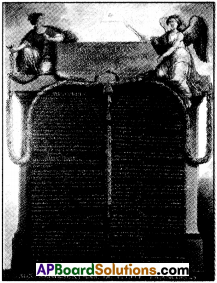
Answer:
The Declaration of Rights of Man and Citizen :
- Men are born and remain free and equal in rights.
- The aim of every political association is the preservation of the natural and inalien¬able rights of man. These are liberty, property, security and resistance to oppression.
- The source of all sovereignty resides in the nation; no group or individual may exercise authority that does not come from the people.
- Liberty consists of the power to do whatever is not injurious to others.
- The law has the right to forbid only actions that are injurious to society.
- Law is the expression of the general will. All citizens have the right to participate in its formation, personally or through their representatives. All citizens are equal be¬fore it.
- No man may be accused, arrested or detained, except in cases determined by the law.
- Every citizen may speak, write and print freely; he must take responsibility for the abuse of such liberty in cases determined by the law.
- For the maintenance of the public force and for the ex¬penses of administration a common tax is indispensable; it must be assessed equally on all citizens in proportion to their means.
- Since property is a sacred and inviolable right, no one may be deprived of it, unless a legally established public necessity requires it. In that case a just compensation must be given in advance.
(Note: The above list is not complete. It is only a selection often.)
Question 8.
Observe the following.
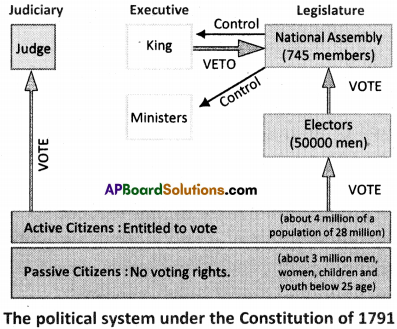
a) Name the bodies among which the powers are distributed.
Answer:
The Judiciary, the Executive and the Legislature are the three bodies among which the powers are distributed.
b) Who were entitled to vote?
Answer:
The Active Citizens were entitled to vote.
c) How many members were there in the National Assembly?
Answer:
There were 745 members in the National Assembly.
d) Did the king have absolute powers?
Answer:
No, he was under the control of the National Assembly.
e) Who were passive citizens?
A. The citizens with no voting rights were the passive citizens.
![]()
Question 9.
Study the following timeline and answer the given questions.
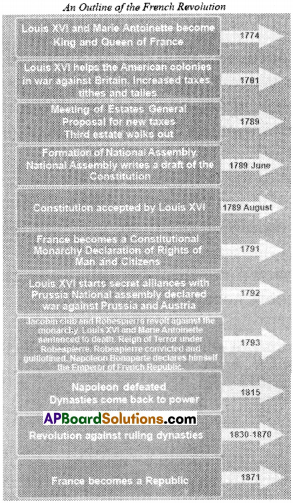
a) When was the draft Constitution written by the National Assembly?
Answer:
In 1789 June. National Assembly had written the draft Constitution.
b) Who was the master of ‘Reign of Terror’?
Answer:
The master of ‘Reign of Terror’ was Robespierre.
c) What was the significance of 1871?
Answer:
The significance of 1871 was that France became republic.
d) When was the Declaration of Rights of Man and Citizens made?
Answer:
The Declaration of Rights of Man and Citizens was made in 1791.
e) Who declared himself the Emperor of French Republic?
Answer:
Napolean Bonaparte declared himself the Emperor of French Republic.
Question 10.
Do you feel that equality of status for women is necessary? Women’s fight for rights in France inspired the world. Do you agree with this?
Answer:
- Yes. Women need to have equal status with men.
- They need to educate themselves, participate in active politics.
- Yes, the political activities of French women during the revolutionary years were kept alive as an inspiring memory.
Question 11.
What would happen if all people were not equal before law – and some special privileges like the right to kill others?
Answer:
- If all people were not equal then society might be divided into classes.
- A few classes might have some privileges and the rest would have to suffer.
- People might not have fundamental rights.
- If a few people had the privilege of killing others it would result in loss of lives to those who do not have had that privilege.
![]()
Question 12.
Locate the following on the world outline map.
1) USA
2) UK
3) France
4) Turkey

Question 13.
Are revolutions essential for human development?
Answer:
- Revolutions are essential for the development of human society.
- Without revolutions or changes, the society and its structure remains static and may not take its course towards the growth and development.
Question 14.
Who are the philosophers that spread the ideas of democracy?
Answer:
- Locke in his book “Two Treatises of Government” sought to refute the doctrine of the divine and absolute right of the monachy.
- Rousseau advocated people’s sovereignty, equality and supremacy of majority.
- Montesquieu’s theory of separation of powers paved way for division of powers.
- Voltaire advocated the theory of restricted powers.
Question 15.
Compare the political rights which the Constitution of 1791 gave to the citizens with Articles from 1 to 6 of the Declaration. Are the two documents consistent? Do the two documents convey the same idea ?
Answer:
- The 1st Article of the Declaration says that ‘All men are free and equal in rights’.
- The 6th Article of the Declaration says that ‘All citizens have the right to participate in the formation of laws’.
- But the Constitution of 1791 contradicted with the Declaration of Rights in giving all the citizens equal political rights.
- According to the Constitution only men above 25 years of age and who paid taxes equal to at least 3 days of a labourer’s wage were given the right to vote.
- Thus the Constitution violates the Declaration of Rights.
- Thus we can say two documents contradicted with each other. They do not convey the same idea.
![]()
Question 16.
How different would our lives have been if we were ruled by kings?
Answer:
- It would be very different if we were ruled by kings.
- They may have had made laws at their will.
- Society might had been divided in high and low castes or estates.
- Estates might have had their privileges and obligations.
- We might have had been denied our fundamental rights.
| IMPORTANT YEARS AND EVENTS | |
| Events | Years |
| 1. Period of Long Parliament | 1640-60 |
| 2. Execution of Charles I | 1649 |
| 3. The Glorious Revolution | 1688 |
| 4. The Declaration of Independence | 1776 |
| 5. The American Revolution | 1783 |
| 6. The French Revolution | 1789 |
| 7. Execution of Louis XVI | 1793 |
| 8. The Reign of Terror | 1793-94 |
| 9. The execution of Robespierre | 1794 |
| 10. The right to vote for women in France | 1946 |
